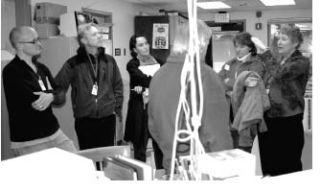Public schools
Vashon Island School District’s board is leading our community to a brighter and healthier future as we are forging a “culture of ecology” in our schools.
My role in that future began with a somewhat accidental, but fortunate, conversation. The Chautauqua custodial crew had mentioned the volume of trash that results from the annual Halloween parties. This led to a chat with Chautauqua Elementary School Principal Kate Baehr about reducing that waste and encouraging the use of more recyclables; I in turn was invited to address the staff, where I received an enthusiastic response.
I had just unwittingly assumed the role of “would-be ecology guy.” That role was formalized shortly thereafter at the direction of Superintendent Terry Lindquist, who asked me to develop a recycling strategy for the whole district. At that point I became a partner in an effort that many on the Island, and numerous committed teachers and district staff, have dreamed of for some time.
I gathered a steering committee of partners who have been calling for a greater level of environmental responsibility across Vashon’s school community for years. They are Claudia Campbell, director of food services, teachers Carolyn Candy and Amy Bogaard and parent Veronica Truffat.
Since November, we have pooled our personal and corporate convictions, passions and strategies to begin leading the district into a greener future. Early on we realized that recycling was only the tip of the (rapidly melting) iceberg.
In the winter, I returned to Dr. Lindquist to propose the pursuit of a comprehensive ecology policy of which recycling would be just one piece. The point of the policy would be to synergize all of our efforts and functioning to a commonly greener end. While we must be highly responsible in our financial decisions, there is a bigger picture coming into view. The way we plan, remodel, build, repair, plant, clean, eat and do other things must be driven by a long-term view that is environmentally responsible while being cost conscious.
With this increased scope we began scouring every resource we could find for help. We discovered great things happening in different classrooms at each of our schools but nothing coalescing efforts on a district-wide level. We on Vashon are in a similar place as many other school districts, and in the absence of good comprehensive models to copy, we are pushing into new territory.
Additionally, the standards set by utility companies and municipalities for measuring consumption, which we hoped might give us a place to start, are based on averages. So the volumes of energy and resources consumed by the most inefficient consumers set the bar. This unfortunately calls everyone to a fairly low standard, which seems neither brighter nor healthier.
On April 3, the school board embraced pursuing and setting standards that other districts, and perhaps even communities, may eventually use as a model. While the board directed the policy statement to be revised by the superintendent, during the rest of the board meeting that evening we saw “ecology” color everything else that was discussed. Discussions on all sorts of topics bumped up against “how will this be impacted by our new ecology policy?”
In our steering committee meetings, we have agreed that to effect positive change we must leverage the entire school community to share the load. From the school board to the kindergarten classes, of which my son Simon is a part, all of us are in this together.
Our goal is to create a “culture of ecology” within the Vashon Island School District. Our conviction is that if we change the culture, we change the community; if we change the community, we change the city; and if we change the city, the larger community might just follow.
This is an extremely consuming but invigorating effort. More and more conversations are taking place from the integration of ecology awareness into the classrooms and how that might look, to putting in a dishwasher for washing reusable lunch trays at Chautauqua instead of throwing away 43,000 styrofoam trays annually.
So with the policy yet to be enacted, the culture is shifting. Decisions are starting to be made in the tension of dollars spent responsibly on all fronts. The discussions in capital facilities planning are being shaped by how we might reconfigure a high school that will not only improve learning and cost less to operate, but how it will also instill a sense of global citizenship in our children.
Our hope is to send out a call for all Islanders to support the efforts of our school board and become a part our district’s culture of ecology.
— Dave Wilke, who has two children at Chautauqua Elementary School, is the facilities and safety director for the Vashon Island School District.



